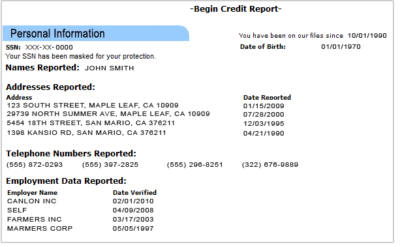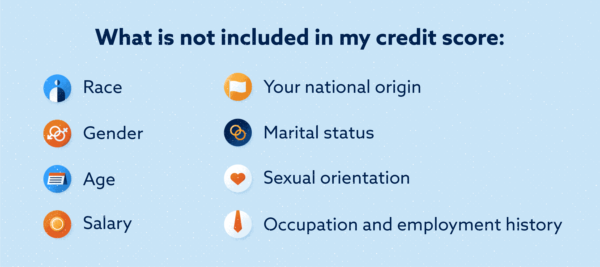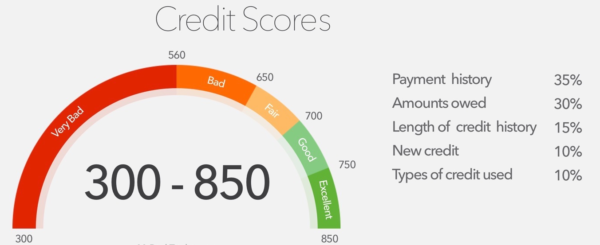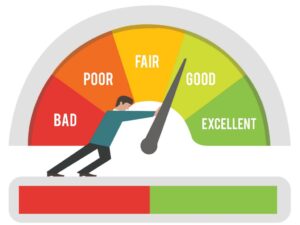Credit Education
What Items Are In Your Credit Report?
• Identifying information such as name, address, date of birth, and names of employers which is usually retrieved from credit application forms;
• Trade lines, all of your credit cards and other accounts; the date of opening the accounts, your credit limits, high balances, current balances, payment history, etc.;
• Credit Inquiries -voluntary and involuntary inquires including account review inquiries (from your current lenders), hard inquiries (for new loan or credit applications) and promotional inquiries (for solicitation offers);
• Public Records (bankruptcies, foreclosures, wage garnishments, liens and judgments);
• Collection accounts.
Items That Are Not Included In Your Credit Score:
Although this information may appear on your credit report,
it is not taken into consideration while calculating your credit score:
• Age;
• Race, color, religion, nationality, sex or marital status;
• Occupation, salary, employer, length of employment;
• Home address;
• Interest rates associated with credit cards and other accounts;
• Child support items and rental history;
• Certain types of inquiries (consumer initiated inquiries or promotional inquiries).
What Is Taken Into Account While Calculating Your Credit Score???

Payment History (35% of your score)
• Current payment records associated with auto loans, mortgages, retail accounts, installment loans, credit cards, etc. on paid as agreed accounts;
• Public records (bankruptcies, foreclosures, wage garnishments, liens and judgments);
• Severity of delinquency (length of time past due);
• Amount past due on accounts or collections;
• Recency of delinquency or public records or collections;
• Number of past due or derogatory accounts.
Payment History Tips
• Pay your bills on time. New late payments and collections produce the biggest impact on the credit score;
• If you are past due for any reason, Get Current! The longer you remain current and pay your bills on time, the higher your credit score will be;
• Be careful about closing accounts. It may result in losing valuable credit score points.
Amounts Owed (30% of your score)
• Amounts owed on revolving accounts;
• Total amount owed on all accounts;
• Number of accounts with balances;
• Proportion of balance to credit limits on revolving accounts;
• Proportion of balance still being owed on installment accounts;
Amounts Owed Tips
• Keep balances low on credit cards and other revolving accounts. A general rule of thumb is keeping your balances below 30% of the credit limit or high balance;
• Pay off debt instead of moving it around. One of the most effective ways to improve your
Credit score is paying down the balances on your credit cards or other revolving accounts.
Owing the same amount but having fewer open accounts may result in a lower credit score.
Keep as many of your revolving accounts below 30% of the credit limit or high balance as possible;
• Don’t open new accounts to increase your available credit. It can produce the opposite effect and actually lower your score.
Length Of History (l5% of your score)
• Age of accounts;
• Number of recently opened accounts;
• Time since account activity;
• Proportion of new credit vs established credit;
• Re- establishing activities after adverse payment problems.
Length Of Credit History Tips
• If your credit history is relatively new, refrain from opening new accounts too rapidly. In fact, it can temporarily bring your credit score down.
• Re-establish yourself if you have negative accounts on your credit report. Opening new accounts responsibly and paying them off on time will eventually increase your credit score. However, this is not a suitable strategy for fast credit score fix;
• A lot of accounts associated with consumer finance companies can be perceived as an adverse factor. Loans given by creditors known to lend to consumers with problematic credit histories, produce a negative impact on your report.
Types Of Credit Used (10% of your score)
Types of your accounts (credit cards, retail accounts, installment loans, mortgages, consumer finance accounts, etc.)
Tips
Apply for accounts and open them only if needed. A rule of thumb is having 3 open and active revolving accounts along with 1-2 installment accounts and one mortgage.
New Credit Inquiries (10% of your score)
• Number of recently opened accounts;
• Number of recent inquiries;
• Time since inquiry;
• Time since account opening;
Credit Inquiries
A credit inquiry will appear on your credit report when your credit report is viewed by an eligible company.
Hard Inquiries
These inquiries affect your credit score. When you apply for a mortgage, auto loan, credit card or other type of account, you authorize the lender to obtain a copy of your credit report. These types of credit inquiries influence your credit score and should be avoided. If you are shopping around for a mortgage, etc. and you know it would result in multiple hard inquiries, make sure you have your credit history viewed within in a short period of time. Depending on which scoring system you are dealing with, you may have a 15 day, 30 day or 45 day time frame to shop around without significant negative consequences. If all potential creditors review your credit history within the allotted time frame, the scoring system will count these multiple inquiries as a single inquiry.
Account Review Inquiries & Consumer Based Inquiries
These types of inquiries do not affect your credit score. When you choose to observe your own credit report through an online resource, it is considered a consumer- based inquiry and will not affect your credit score. Also, a lot of creditors and collection agencies are authorized to browse your credit report to review your account activity. Credit reports requested by prospective employers will not affect your score as well.




